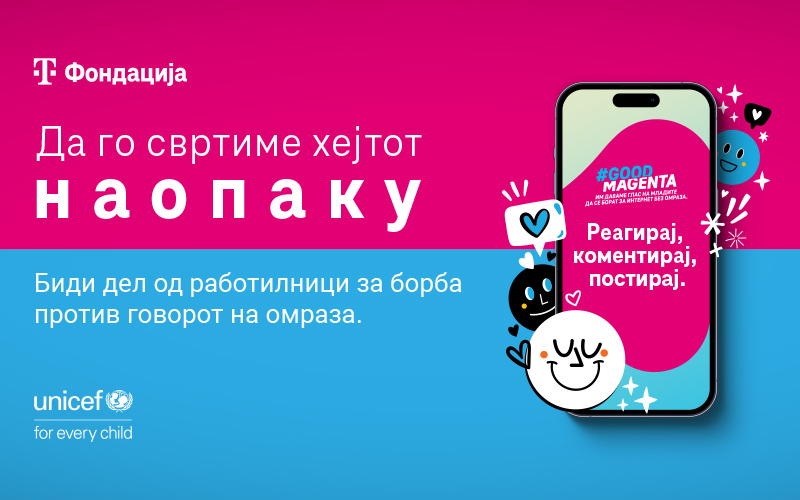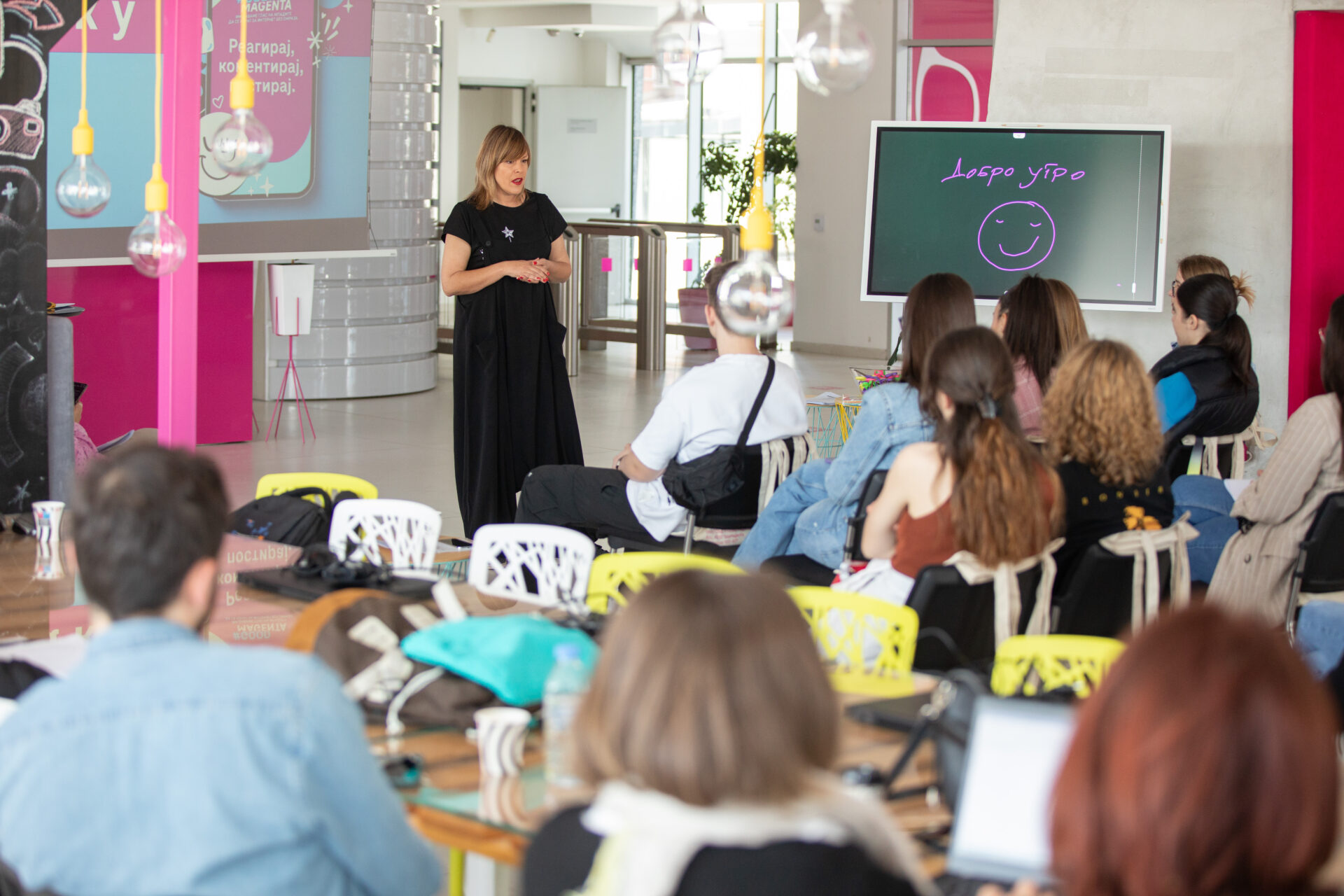This story is part of the Initiative between Association Konekt and AmCham within the USAID’s Partnership for Giving Project, and is recognized as one of the Best Practices for Corporate Philanthropy.
Introduction
Foundation Telekom for Macedonia was founded in 2002, as one of the first corporate foundations. The focus of our work is digital inclusion, save internet and human centric technology. We use technology as a toll for better life and engage children and young people in tackling some of the biggest challenges facing their generation. We work on long-term projects, with strategic partnerships.
Together for a Hate Free Net is youth led safe internet initiative, created in partnership with UNICEF. The main goal of the initiative is to involve and teach young people how to fight for hate free net. We give them voice, knowledge and space to make a difference. Through intensive workshops and co-creation with professionals, they made a social media campaign.
This is more than community investment. It is our strategic commitment, because as a leader that is building digital society, we are taking a step beyond by assuming the ambitious task of working on the ethics of such digital future. As a leading telecommunications company, we equip people with the best the digital world has to offer, thereby creating millions of connections every day. But we want more and we are doing more. Not only are we expanding our network, we are also helping to make it a safe and tolerant space for everyone. We are not just enabling a more digital future but also one that is fairer, more sustainable, and more worth living for.

This Practice as a Game-changer
As a company that leads digital transformation, we feel that one of our most important responsibilities is to accompany this transformation. Not only do we provide the required network infrastructure and suitable products, we are committed to a net that is open-minded, welcoming and accessible for everyone, with room for different perspectives and opinions. For a network without hate, where people treat each other with respect.
This is our strategy, and a reason we started the initiative – Together for a Hate Free Net. But, we want to do a change, not only raise awareness of the problem. We wanted to make a step towards changing online behavior among young people. That is not an easy task, so we decide to:
- Make a partnership for a better impact – partnership with UNICEF in order to improve engagement of the youth
- Involve young people directly in order to touch the target audience better (from youth to youth)
So, through co-creation workshops facilitated by communication, media literacy, child protection, technology professionals and multi-media content creators, children and young people learned how to deal with threats and how to create a campaign to raise the awareness of their peers and the general public.
Paving the Road Towards Success
Our goal was to reach as many young people as possible, to make a positive change, be loud, speak up, do this through the young people’s voices and be present in media longer period of time. In order to this, we used many communication channels and tools, also announcing every step of the progress. This is a long-term project and was communicated in a period of 4 months. This initiative is consisted of 3 main phases:
Announcing of the partnership and open call. We started communication about the importance of safe internet and our intention to involve young people in creating a campaign. Open call was announced, inviting children and young people to join communication initiatives to address barriers that allow cyberbullying and hate speech to persist in social media.
Workshops – 30 children and young people participated in design thinking sessions and facilitated group work to conceptualize a campaign and develop messaging. During the workshops, young people learned more about cyberbullying, how to recognize and prevent it, they defined goals of the campaign, producing the videos and other communication materials. Guided through a design thinking process they defined target groups and developed campaign plan and product concepts. In the spirit of co-creation, the entire process is led by children and young people, guided by psychologists, creative and communication experts.
Campaign – On International Day for Countering Hate Speech, we started the youth campaign under the slogan “Bullying Bye Bye”. The campaign includes over twenty social media videos. Some including messages such as “Words carry weight so choose them carefully” to shed light on the harmful effects of cyberbullying. Others include messages calling on young people themselves to not be bystanders and offer support if they witness cyberbullying. The campaign was ongoing on social media for 2 months.


Objectives’ Achievement
There are 2 important KPI’s that we achieved with this initiative.
#GoodMagenta label
This is Deutsche Telekom label, that demonstrate how we live up to our societal responsibilities. The label help to highlight our diverse commitment to society. #GoodMagenta, identifies projects, measures and initiatives with a positive contribution to social and societal challenges in the digital world. For the initiative Together for a Free Net we were awarded Good Magenta, meaning that we have an extraordinary initiative dedicated to a tolerant and safer internet for everyone. With every labeled initiative, Deutsche Telekom openly commit to our promise to become a little better every day and to live up to responsibility toward the society.
To reach as many young people as possible
1.600 000 total PR reach, 49 announcements, 612455 – Social media reach (only Telekom profiles, this number will be doubled by UNICEF posts).
Further Action
When we started the strategy for the initiative, we knew the real challenges:
- Young people using internet and social media without ethics can lead to risks and unacceptable behavour (cyberbullying, hate speech, gender related negative attitudes and other forms of peer-to-peer violence)
- 88.3% of young people participate on social networks (stat.gov.mk p. 4; p.6) where most cyberviolence and cyber-bullying takes place (Amnesty p. 18, Table 2)
- 35% of youth have felt unsafe online more than one time (U-Report Q1) Mechanisms for protection in North Macedonia are scattered (U-Report Q6)
- Online violence can affect young people lives negatively, causing: isolation, fear, empower violent behavior, even self-harm (enough.org bullet #6)
But, having this in mind, we knew that we must find a solution to make not only another communication, but something that will have an impact, effect. So, we came to conclusion that we want to:
- Create youth lead workshop and campaign to empower positive behavior and protect young people online
- Content that will be created and spread through young people in order to touch the target audience better (from youth to youth)
- Partnership with UNICEF in order to improve engagement of the youth
- Include young people from different social surroundings (, different ethnicities and gender
We plan to continue this initiative in the future.
“All over the world, cyberbullying is an everyday reality of children and young people. Repeated hurtful behaviors aimed at scaring, angering, or shaming those who are targeted impacts their overall emotional well-being and mental health,” said Patrizia DiGiovanni, UNICEF Representative. “I am proud to see how young people themselves have come together to speak up and use their creativity to promote being respectful and kind to their peers and to defend the victims.”
The article in Macedonian language, published by Kapital can be found HERE.

